Appleby College THE OUR KIDS REVIEW
The 50-page review of Appleby College, published as a book (in print and online), is part of our series of in-depth accounts of Canada's leading private schools. Insights were garnered by Our Kids editor visiting the school and interviewing students, parents, faculty and administrators.
Our Kids editor speaks about Appleby College
Basics/Background
Appleby is a co-educational day school for students from grades 7 through 11, with boarding available from grades 9 through 12. All students are required to board on campus for grade 12. Instruction follows an integrated liberal-arts curriculum: humanities, natural and social sciences, the arts, and IT.
The college was established by John Guest in 1911. He had been headmaster at Upper Canada College and wanted to build a small school in the country. Financial backing was provided by Sir Byron Edmund Walker, a prominent businessman and also Guest’s father-in-law. In addition to business and philanthropy, Walker was an avid amateur natural historian and art collector. He was truly a man of his age, and seemed to rejoice in combining his talents and voracious curiosity with the opportunities that he found, seemingly, everywhere he looked. “Remember each day,” he said, “that we shall be judged by our children according to the use we have made of the really vast opportunity which fortune has placed in our hands.” “Walker’s talents,” wrote one commentator, “served to develop more aspects of Canadian life than those of any of his contemporaries.” He revolutionized banking in Canada, for one. Then, when he donated his fossils and Japanese prints to the Royal Ontario Museum, he at a stroke established both of those collections. Many items collected by Walker remain on display there today.
“… we shall be judged by our children according to the use we have made of the really vast opportunity which fortune has placed in our hands.”
—Sir Edmund Walker
Walker’s influence is still very much felt at Appleby. “Edmund Walker talked a lot about the greatest calling in life being finding ways to serve your community,” says principal Innes van Nostrand. “[His] vision for Appleby College was to produce potential leaders for the nation, who aspired for more than money, and who understood the importance of the world beyond Canada.” (It’s in his name that the Sir Edmund Walker Scholarship Program that was established in 2013, in part to celebrate his goals for the school.)
With the purchase of the property, Guest pitched a tent and moved in. He oversaw the construction, set the curriculum, and recruited faculty and staff. He created the foundation—physically and academically—that is still evident at the school today. “When he built something,” his son-in-law later said, “it stayed built.” And indeed it has. Colley House, the principal’s residence, and the Chapel all remain from Guest’s time at the school. The student commons were later named in his honour.
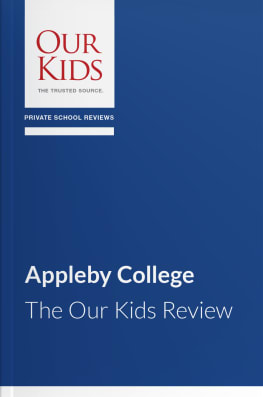
Key words for Appleby College: Tradition. Diversity. Innovation.
Innovation and development
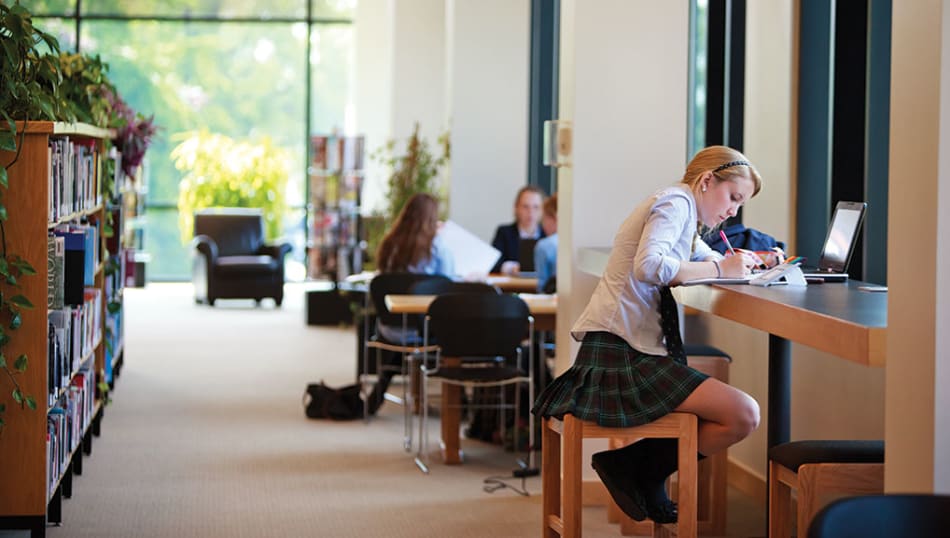
Appleby is known for a culture of academic innovation, and indeed there are many examples of that, both past and present. There are long-standing programs of global education and experiential learning, as well as of adopting new technologies and practices, Appleby was the second school in North America to use laptops in the classroom, and the first in Canada to do so. In 1995, it instituted a school-wide Mandarin program, becoming an early adopter of something seen more widely today. The creation of a design lab in 2016, while not the first example of its kind, is nevertheless emblematic of an ongoing commitment to academic development and innovation. Appleby is also the first boarding school in North America to offer an integrated global education program, the Appleby College Diploma with Distinction in Global Leadership.
Says van Nostrand, “You want to make sure that you find a way to respect your traditions and the values that have made you successful until now. But, you also want to be innovative and if we at times err on the side of innovation, I don’t think that’s necessarily a bad thing.”
Atmosphere
Appleby began its life as an all-boys school, becoming coed in 1991, this year marking 25 years of coed education. Fraser Grant experienced the school prior and post that change, first as a student and, since 1999, as a member of the faculty. “It’s moved from a being a school focused, when it was all boys, on athletics and academics to one where, now, there is a greater breadth of opportunity” such as a more dedicated attention to the arts.
The campus is, frankly, strikingly beautiful. The initial gestalt is that of traditional boarding school very much in style of the English model that many schools in Canada have taken cues from. Appleby has all the trappings: ties, houses, a Latin motto, crests, kilts, and values founded in the Anglican tradition. “Appleby has been here for a long time,” said past principal Guy McLean at the time of the school’s centennial, “and we want our students to have a sense of the history and tradition of the school. But at the same time it has to be contemporary and modern in terms of usability, and [to] fit the needs of students.”
And, it’s impressive. “It does seem daunting, with those big iron gates,” says Simmi Basi, a parent of three current students and one graduate. “You might see these fancy cars,” and indeed, at drop off and pick up times, you do. Whenever someone might note the stereotypes those kinds of things can suggest, Basi says “my response, truly, is please come with me one day … is just to say ‘take one step beyond that gate.” Which, for the most part, people are free to do. The campus is open, the gates are ornamental, and the community beyond the school makes use of the space in various ways. Rather than feeling onerous, the traditions help to create a sense of place. Says student Josie Jelinek “you feel like you are a part of something bigger.”
Guest intended the campus to be pastoral, and despite a century of development around the school, it retains a pastoral feel. The campus is bounded to the south by Lake Ontario, and to the west by forest, occupying 60 acres. The northern campus, Rabbitnose Island in Temagami, is home to the outdoor education program, and adds another 11 acres to the school’s overall geographic footprint.
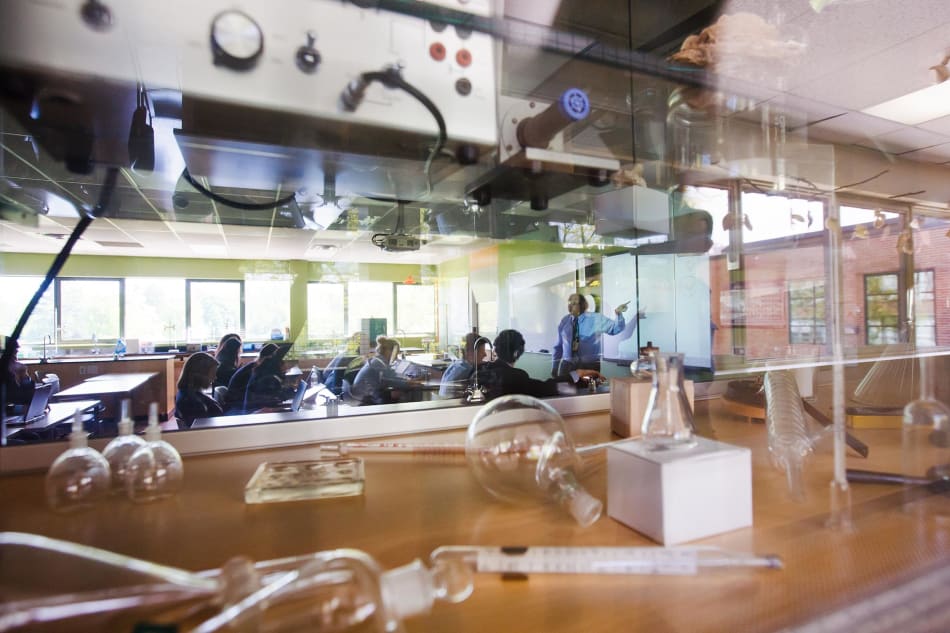
Academics
Social currency at Appleby is gained, by and large, through academics, athletic achievement, and doing well in the arts. “Your friends are all getting good marks and you’re a big loser if you don’t,” says a recent grad. “I’d heard that Appleby was a very competitive place,” says student Ivan Hu, “and it’s proven to be one … one of my worries was that I wouldn’t be as successful as I am. But when I got here, I tried different things. … the competitiveness really pushed me, challenged me, and helped me become who I am right now.”
“It is definitely not an ‘exam factory,’” says a recent graduate. “There are numerous group assignments and presentations built into the curriculum so that exams only count for about 25% of your final mark in a course. The student body is not too competitive, although you do run into some competitive types.”
Classes begin at 8 and finish at 3:45, followed by extra-curricular activities, service programs, and athletics until 5:15. The school describes the day as “good busy”: a full schedule to keep students active and engaged, yet managed as not to feel onerous. “You have your school day, and right after school you have club or a sport,” says Jill Froembling. “For me in the beginning, it was very difficult to manage my time wisely, so [that] I have time for everything I want to do.”
“The teachers are always available for extra help,” says student Madeline Power, “and they set really reasonable timelines. So, at the end of the day, I feel like we have all the resources to succeed here, so it’s really all about your goals and how you manage your time. … The longer days and the busy schedule have prepared me for university. I feel like I can go and be successful and know what I’m doing.”
That said, scheduling is an area of student life that the school regularly reviews. “We program a lot,” says Tom Karcz, “and there are benefits from that. … [but] I’d love to see the school continue to look at the schedule and how we organize everyone’s time. [This to] see what impact that has on health and wellbeing, and how people feel about themselves.” In the past few years, there have been some minor changes to the schedule, creating more time for students that is unstructured. Karcz sees this as part of an ongoing process of examination and reconsideration to ensure that students have both the structure and the freedom that they need.
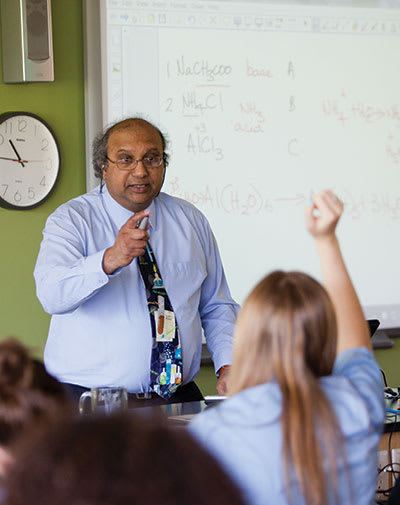
The teaching environment
Physical transformations and teaching styles have been adopted to reflect the school’s values and academic mission. The campus is largely paperless, as it has been for the better part of a decade. All students submit papers, take notes, maintain schedules, and conference with teachers and peers through OneNote, a Microsoft app for tablet, phone, and computer. “We’ve not used paper submissions for lab reports, papers … well, we haven’t carried paper in our hands, for 10 years or so” says Anjuli Ahooja, a physics instructor. The one exception is exams, which are still typically given and graded on paper.
Though it’s been offering advanced placement credits for the past two decades, Appleby recently launched its AP Capstone program, formalizing a dedication to the benefits of AP offerings. Says Carlos Heleno, “We’re educating students to be leaders of character. We’re trying to do everything we can to build very strong academic students who love what they do and who love to learn.” He believes that the AP programs further that goal. “You can choose whatever courses you want to take. It’s up to you to choose what you want to focus on.”
“… they’re walking around the room, describing how they arrived at the solutions.”
In a majority of classrooms, flexible/adaptable furniture supports a cooperative, project-based learning environment. “When there’s no one here,” says Katrina Samson, head of school, “each of the classrooms looks similar in terms of its structure. But when you walk down the halls when classes are in session, each classroom will look very different depending on the subject area, the day, what they’re doing.” Tables are moved to form pods, pushed together for large-group discussion, or faced forward.
“A math class is a great example,” says Samson as she enters a classroom where whiteboards line all of the walls. “Students are up, putting solutions to a range of problems on the board, and then they’re walking around the room, describing how they arrived at the solutions.”
Students are responsible to arrive in class prepared to engage meaningfully in discussion, creating a sense of co-responsibility and co-ownership over exploration and learning. The expectation is that they’ve read any relevant course material and have developed some facility with the core concepts. In class, the teacher acts more as a guide than an instructor. “If they come in without having anything read, without having anything done, there’s nothing happening,” says Samson. “When they have to walk through their thinking process there is that sense of co-creation of knowledge that certainly didn’t exist in the classrooms we knew as students.”
“We’re trying to do everything we can to build very strong academic students who love what they do and love to learn.”
Co-curricular programs
Each term, students are required to take part in a co-curricular activity, and the range of activities available is as broad as the curriculum and then some. Athletics activities include practices four times each week and, for the competitive teams, may require some travel to participate in athletic events. Arts and service activities meet four times each week, typically for an hour or two.
While physical fitness is one intention of the co-curricular program—at some point most students will be compelled to take part in an athletic activity—the main idea is to create a requirement for students to try new things, and to take part in a breadth of activities over the course of their time at Appleby.
“Our middle school kids only do sports for their co-curriculars,” says Marg Hagey, director of the program. “But in upper school we open up arts and service for them as well.” Service activities range from working with Big Brothers/Big Sisters, to environmental programs, to working within local senior care residences. For the most part, programs are created either to appeal to a specific interests within the student population or to capitalize on those within the faculty. “We want to know what the kids have interest in, [as well as] the hidden talents that faculty have. We try to keep things fresh all the time.” In addition, all students are required to join at least one club, with clubs meeting for about an hour once each week for the duration of the school year.

Student leadership
“A lot of schools say, ‘wow you’ve got a lot of titles in your school,” says Hagey. That’s true both within the faculty and the student body. “We have 15 different portfolios and job descriptions,” she says of the prefect system, all of which are filled through application rather and student votes. “Not all schools are like that,” with popular vote being more typical. “Our kids apply.”
Each house has a head prefect, as do athletics, the arts, and so on. “There are lots of opportunity for leadership,” says Hagey. “As a school, philosophically, we think it’s important.”
The leadership program that she oversees includes an attention to relational leadership, namely, how students behave responsibly outside of formal leadership roles. “It’s about how we interact with people,” she says “rather than accountability for a job title. … Relational leadership is going to have a greater impact in life. You know, people can aspire to positional titles, and move up that way, but to graduate kids that treat each other well can make the world a better place.”
“...to graduate kids that treat each other well can make the world a better place.”
Chapel
Chapel takes place mid-morning, and students attend a few times each week. Chapel is rooted in the Anglican tradition, and pastoral services are delivered by an ordained Anglican chaplain, as are weekly worship services distinct from the daily chapel services that students are required to attend.
The mandatory services are interfaith. They are built on the values of the Anglican church, as well as those of the school, yet set within a largely secular context. The intention is to bring the student body together to reflect on events in the life of the school. Additionally, each Wednesday a student is chosen to deliver a chapel speech. In one this past September, student Nicole Lee spoke on the importance of asking for help. “You can do anything on your own,” she said in her address, “but it would be a whole lot easier with somebody by your side. … having connections, and a support net, is extremely important in trying to reach your goals.”
Chapel services provide the basis for the Appleby community, and provide a focal point for the school's culture. Among other things, chapel provides a unique sense of community and belonging.
Learning in a global context
“I think of Canada as a microcosm of the world,” says van Nostrand, “and I think of Appleby as a microcosm of Canada.” Last year, students arrived from 40 different countries, the flags of which line one side of a common area at the centre of the property. “There is a richness that is added,” he says in regard to the diversity within the school, “when it’s not the same kids that you’ve always grown up with, who come from similar cultural backgrounds.”
Certainly, Appleby has long dedicated itself to global education, both on campus and off, perhaps more than any other school in Canada. John Grant started the travel programs in the ‘20s and ‘30s, something that was as unique as it was prescient. John Osler took part in one of the first, boarding the Cunard liner Ascania in the spring of 1932 for a tour of Europe: “This trip was an experience, which created a deeper impression on my mind than any other event which I can remember, and it was an absolute revelation to me to see how some of the other people of this world live, what they do, how they dress, talk, and to a certain degree, what they think. It has given me … a much broader outlook on life.”
The details of the international programs have changed, including an emphasis on service learning, though the sense of their value has grown over the years. Rob McGuiness, director of the global education program, says “If [students] are going to make a significant impact in any field you name—science, or business, or social justice, or athletics—part of it is actually having an international outlook, and international literacy.” He adds that “it’s not just about studying the globe,” but about encouraging students’ awareness of their place within it through real-world experiences and interactions.
“It is becoming easier to communicate across borders but harder to hear, because we don’t always know what to listen for. To be a good listener you have to understand where the other person is coming from. Building that understanding requires education plus enthusiasm and effort. The world does not lack technology but we do lack communication that builds trust and builds understanding of our shared future.”
—William Crosbie, Appleby ’74
The school works diligently to keep the global education initiatives closely aligned with the delivery of the core curriculum. At times, it can be a fine line to negotiate. Service is an aspect of the global education program, with students travelling to work within specific communities for, in some cases, weeks at a time.
There are a lot of caveats in this kind of thing, paternalism being prime among them. “You have to be careful that you’re not looking at it as mission work,” says McGuiness. “We use our international service learning program as service learning, much more about developing understanding about differences, similarities, situations. ... [and] working with the community solving things together.” He’s clear that it’s less about building walls, or digging wells (thought, yes, those things may at times be part of it) and more about learning about the world and our places within it. The goal is for students to come away “really feeling like they understand more about a location, the people, the culture, the influences there, and the youth in that area, how they’re really not much different than themselves except for circumstance.”
In 2010 Harrison Reilly took part in a service trip to Peru where he and others helped restore clean drinking water within a rural community. “The work was physically demanding,” he says, “but also incredibly rewarding.”
The goals of the program were formalized with the creation of Appleby College Diploma with Distinction in Global Leadership, offered for the first time in 2011. It is a supplemental, enriched diploma, intended to develop students’ global competencies. There are academic requirements, including languages and literatures, and as experiential programs. Also required is the completion of a global action plan based on what students have learned within the program. It requires students to think of how they will turn their learning into action, and to begin forming some concrete ideas about what they’d like to accomplish in their careers in university and beyond.
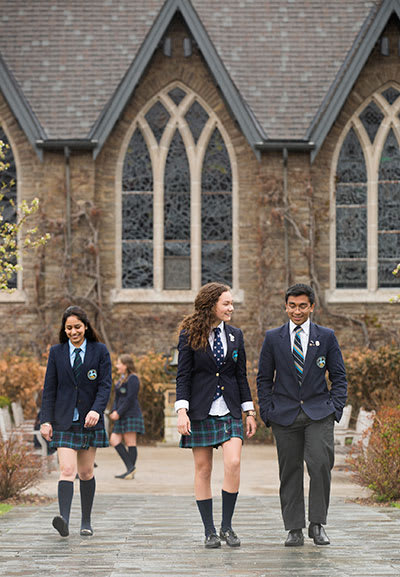
Pastoral Care
A majority of the pastoral care programs are all relatively recent initiatives, all undertaken within the past 10 years or so. Tom Karcz, assistant head of school, student life, suggests that’s not something specific to Appleby, but of care programs in general. This has been inspired in part by a rising awareness of mental health issues within the Canadian culture in general, and a wider understanding and acceptance of gender diversity.
“At least in North America,” says Lindsay Naumetz, director of health and wellness, “schools are taking a more active role in student mental health. They're realizing that there is something we can do, and we should be doing, because if you’re not healthy and well mentally, that makes learning very difficult.” She notes that “we are not the ultimate solution to student mental health issues, but we can invest in the promotion and prevention aspects [of mental health]. We can invest a little bit in the response, in treating a student who has a mental health issue, but that’s not where we excel, and there are supports in the community for treatment.”
That said, programs have also been instigated through an attention to the school community. Karcz gives anxiety as an example of that attention: “A few years ago we were starting to notice kids presenting with anxiety, but anxiety of a form where they weren’t coping. We seemed to have a higher quantity of kids who were presenting as not coping with what should be non-catastrophic stress.”
Because of that, they undertook a school-wide wellness review in 2015, canvassing students and faculty. Through the review they identified a number of common themes in addressing mental health, with a specific attention to strategies for preventative maintenance. “We’d obviously had things in place for response,” says Karcz, “we have a health centre here, we have a guidance team, and we could refer kids out. But we needed to focus more, I think, on the prevention and promotion.”
“What better thing to do than try to make your school a kinder community?”
Ultimately, he feels the most important question a school can ask, in terms of overall wellness, is “Is it a warm and a caring environment for each student? Does a student feel, if they express their identity, they will be confirmed and affirmed as a person? Or are they going to be shunned and excluded?”
He recalls that last year some boarding students approached the wellness team to say that, while “there is a lot of kindness and niceness” there is some room for improvement. That’s something he clearly takes to heart. “What better thing to do than try to make your school a kinder community?”
That task, says Karcz, includes staff and faculty training as well as work with the entire student population. An example is a recent popsicle stick lunch: students were given coloured popsicle sticks on entering the cafeteria, with like colours asked to sit together, disrupting the more typical ways that students would organize themselves.
Those kinds of things don’t happen every day, though Naumetz doesn’t feel that they need to. They are intended as instructive moments toward an ongoing attention to guiding the culture of the school. She feels that as long as the school operates with those kinds of principles in mind—being proactive around the formation of cliques, stress, bullying—and does it in visible ways, over time the overall net effect can be significant.
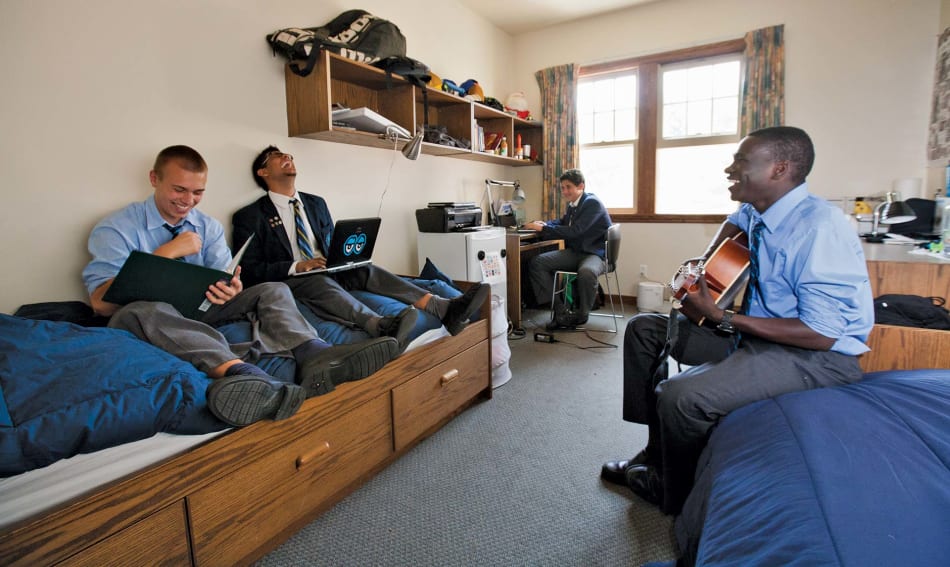
“The most important question a school can ask, in terms of overall wellness, is ‘Is it a warm and a caring environment for each student?’”
Discipline
While discipline is fair and flexible, there is nevertheless a strict no-tolerance policy regarding drugs and alcohol, one that was very publicly tested in 2010. That spring a student was caught celebrating the end of the term and the end of his high school career by smoking marijuana in his dorm room. The student was expelled, leaving school with an Ontario diploma rather than the Appleby diploma.
The code of conduct is signed by both students and parents.
In the press the school was almost invariably cast as “the posh private school” and “one of the most expensive schools in the world” (it isn’t) unduly exercising its authority. The story gained traction because of range of elements in involved—wealth, privilege, ability, community, drug use, teen life—and mud was cast liberally in all directions. That students are given laptops and “interactive whiteboards are used in classrooms instead of chalkboards” was reported as if to suggest something more than the use of technology.
To its credit, and despite the public pressure, the school stood by its policy. The code of conduct is signed by both students and parents. Offenses that fall under the no-tolerance guideline include drugs, alcohol, and possessing weapons. The code includes a clause stating that anyone accused will be given an opportunity to discuss it with the head of school, and otherwise that all due diligence will be taken to ensure that there aren’t any missteps. While expulsions are rare, they do happen. The case that gained the attention of the press certainly wasn’t the first. Likewise, the story was more complicated than was widely reported. There were in fact two students involved, not just one. Further, the infractions that were broken went beyond having and using a banned substance, including the presence of an open flame within the residence hall.
Money matters
Appleby was incorporated as a not-for-profit at the time of its founding in 1911, and has remained a not-for-profit institution ever since. It is governed by a board of directors comprised of alumni, parents, and local community leaders. A majority of the operating revenue comes from tuition, with the remainder coming in the form of charitable donations. Since 1959, donations and endowment funds have been managed by the Appleby College Foundation. The foundation is separate from the school, is legally-incorporated, and is governed by a board of trustees that operates independently of the school administration.
Fees include meals—lunch for day students and all meals for boarders—and annual trips to Temagami. Not included in tuition is the cost of books, uniforms, travel (including athletic and international service trips) and busing.
The financial aid program is robust. Appleby provides over $3.4 million in bursaries, loans and scholarships annually. Approximately 17% of Appleby College families receive financial assistance annually, a number that the school intends to raise to 25% in the next five years. The Sir Edmund Walker Scholarship program provides up to 10 new incoming students a one-time $10,000 scholarship to be used towards tuition. Fundraising, too, is an aspect of the ongoing life of the school.
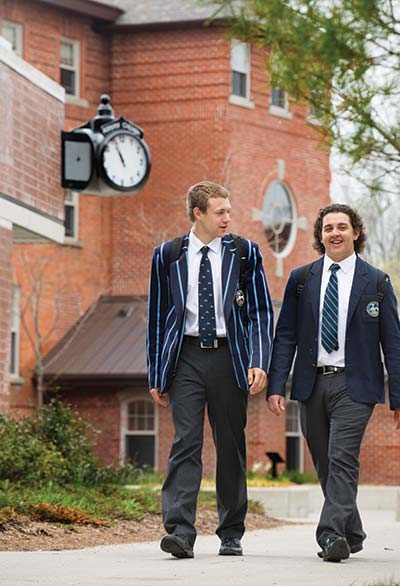
Associations
Appleby was the first, and to date the only, Canadian school to be a member of the G20 Schools, an international association of private schools. In 1993 it became was the first school in Canada to join the Round Square program, today an association of 80 schools around the world. It’s a member of the Belgian-based UCAPE (Union for Cultural and Professional Advancement in Europe), creating an opportunity for students to earn a Diploma in European Proficiency.
The takeaway
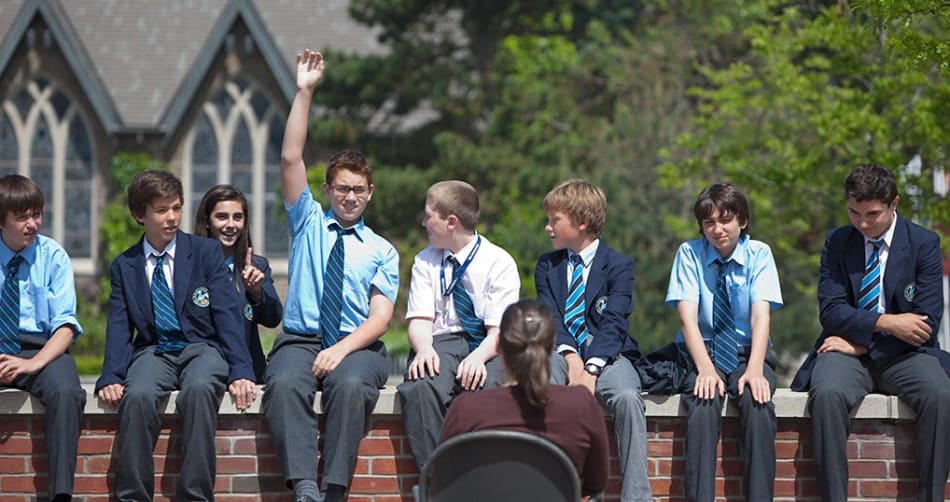
Appleby has always been at the intersection of many things: tradition, innovation, new practices and long-held beliefs. It’s not always a comfortable position. Given its visibility—it’s one of the best known schools in Ontario if not the entire country—it can at times become a lightning rod, most often around discussions that have no bearing on school life or the realities of life within the school. “Schools mirror the world we live in,” quotes Andrew Solomon in his book Far from the Tree. “They can’t be perfect places.” That’s certainly true of all schools, Appleby included. They all reflect their time, and as times change, they reflect that too. What defines a great school, though, is a willingness to address imperfection, to continually evaluate what they’re doing and what students require of them, and to adapt to meet their needs and those of the world beyond its walls.
Then, as now, you’d be hard pressed to find a school as ahead of the curve as Appleby
While the facades of the school may seem timeless, the reality of the school is based in a constant willingness to look ahead, just as John Guest did in 1911. To ask, “what can we be doing better,” and then digging in and doing it. Then, as now, you’d be hard pressed to find a school as ahead of the curve as Appleby. Likewise, you’d be hard pressed to find one that has also had such a consistent vision over such a long period of time. Yes, people will always find things to pick at, and to grumble about, and perhaps to criticise. Nevertheless, Appleby has become one of the country’s great educational institutions, both by serving the students that attend and by providing an example that schools, public and private, have felt compelled to follow.
Photography by Mike Pochwat and Peter Power for Our Kids Media, in combination with photos supplied by Appleby College




